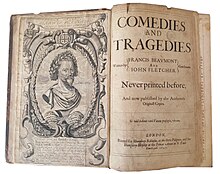Beaumont and Fletcher
team writers of the early Jacobean era
Beaumont and Fletcher were the English dramatists Francis Beaumont and John Fletcher, who collaborated in their writing during the reign of James I. Their collaboration was so well regarded that works individually authored by either are sometimes errantly reported as having been by the collaboration. These include later collaborations by Fletcher with Nathan Field and Philip Massinger.


Quotes
edit- It is always good
When a man has two irons in the fire.- The Faithful Friends (c. 1608), Act I, scene 2.
- Of every noble action the intent
Is to give worth reward, vice punishment.- The Captain (c. 1609–12; published 1647), Act V, scene 5.
- As cold as cucumbers.
- Cupid's Revenge (1615), Act I, scene 1.
- Calamity is man's true touchstone.
- Four Plays in One (c. 1608–13; published 1647), scene 1, The Triumph of Honour, line 67.
- Silken rest
Tie all thy cares up!- Four Plays in One (c. 1608–13; published 1647), scene 4, The Triumph of Love, line 67.
- You are no better than you should be.
- The Coxcomb (c. 1608–10; 1647), Act IV, scene 3.
- I care not two-pence.
- The Coxcomb (c. 1608–10; 1647), Act IV, scene 3.
- To have been happy, madame, adds to calamity.
- The Fair Maid of the Inn(licensed 22 January 1626; 1647), Act I, scene 1, line 250.
The Maid's Tragedy (c. 1609; published 1619)
edit- Upon my buried body lie lightly, gentle earth.
- Act I, scene 2.
- Then, my good girls, be more than women, wise:
At least be more than I was; and be sure
You credit anything the light gives life to
Before a man.- Act II, scene 2.
- A soul as white as Heaven.
- Act IV, scene 1.
- But they that are above
Have ends in everything.- Act V, scene 4.
Philaster, or Love Lies a-Bleeding (c. 1609; printed 1629)
edit- After supper walk a mile.
- Act II, scene 4.
- Nature too unkind;
That made no medicine for a troubled mind!- Act III, scene 1.
- Philaster: Oh, but thou dost not know
What 'tis to die.
Bellario: Yes, I do know, my lord:
'Tis Less than to be born, a lasting sleep;
A quiet resting from all jealousy
A thing we all pursue; I know, besides,
'Tis but a giving over of a game
That must be lost.- Act III scene 2.
- Make my breast
Transparent as pure crystal, that the world,
Jealous of me, may see the foulest thought
My heart holds.- Act III, scene 2, line 144. These lines are used almost unaltered ("holds" becoming "does hold") by George Villiers, 2nd Duke of Buckingham in Act III, scene ii of his The Restauration, an adaptation of Philaster. They appear with an attribution to Buckingham in many 19th century collections of quotations, e.g. Henry George Bohn A Dictionary of Quotations from the English Poets (1867) p. 63, and hence also on several quotation websites.
- The devil take the hindmost!
- Act V.
- 'Tis not a life,
'Tis but a piece of childhood thrown away.- Act V, scene 2, line 15.
- All your better deeds
Shall be in water writ, but this in marble.- Act V, scene 3.
A King and No King (1611; published 1619)
edit- It shew'd discretion, the best part of valor.
- Act IV, scene 3.
- But is there nothing else,
That we may do but only walk? Methinks,
Brothers and sisters lawfully may kiss.- Act IV, scene 4.
- He shall have chariots easier than air,
That I will have invented;... And thyself,
That art the messenger, shalt ride before him
On a horse cut out of an entire diamond.
That shall be made to go with golden wheels,
I know not how yet.- Act V.
- There is a method in man's wickedness—
It grows up by degrees.- Act V, scene 4.
Love's Cure (c. 1612–13; revised c. 1625; published 1647)
edit- Hit the nail on the head.
- Act II, scene 1.
- Thou will scarce be a man before thy mother.
- Act II, scene 2.
- I find the medicine worse than the malady.
- Act III, scene 2. Compare: "The remedy is worse than the disease", Francis Bacon, Of Seditions.
- What's one man's poison, signor,
Is another's meat or drink.- Act III, scene 2.
- He went away with a flea in 's ear.
- Act III, scene 3.
The Scornful Lady (c. 1613; printed 1616)
edit- It would talk,— Lord! how it talked!
- Act V, Scene 1. Compare: "Then he will talk—good gods! how he will talk!" Nathaniel Lee, The Rival Queens, or the Death of Alexander the Great (1677), Act I, scene 3.
- Kiss till the cow comes home.
- Act III, scene 1.
- My dancing days are done.
- Act V, scene 3.
- Beggars must be no choosers.
- Act V, scene 3.